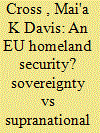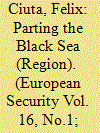| Srl | Item |
| 1 |
ID:
079722


|
|
|
|
|
| Publication |
2007.
|
| Summary/Abstract |
Since the 1992 Maastricht Treaty, and particularly since 9/11, the current path of European integration may mean the difference between a strong and secure Europe and the disintegration of a grand, idealistic experiment. This is especially true in light of a growing transatlantic divide, and the need for new security policies to combat terrorism. As Europe grapples with this security issue, will strongly held beliefs about sovereignty cede ground to an untested supranational order? This article provides evidence that this process is already occurring, in large part because of the influential role of transnational experts in security technology. In the context of Europe, the possibility of a kind of EU Homeland Security is at the core of its future security role in the world
|
|
|
|
|
|
|
|
|
|
|
|
|
|
|
|
| 2 |
ID:
079719


|
|
|
|
|
| Publication |
2007.
|
| Summary/Abstract |
The article examines the factors that led to the establishment and evolution of the minilateral cooperation among France, Germany, the United Kingdom (and eventually the High Representative for CFSP) vis-à-vis Iran. The analysis brings together two theoretical approaches, institutional design and role theory. It posits that minilateral cooperation in the Iranian case and security affairs in general do not easily translate into multilateral cooperation. It finds that in contrast to the trade and economic realm, the course of security minilaterals is strongly shaped by rivalling formal institutions, specific characteristics in the non-proliferation regime (lack of specificity in central norms) and the role behaviour of the United States. European minilateral cooperation started (as in the case of the Middle East Quartet and Six-Party Talks) when the US rejected bilateral engagement. The initiative successfully mediated a temporary suspension of Iran's enrichment activities as long as Tehran believed that the EU-3 could bring the US to the table and commit the Bush Administration to a comprehensive negotiated settlement, including US security guarantees. Since the EU-3 and the subsequent P-5 (the permanent five members of the UNSC) plus Germany/EU High Representative for CFSP minilaterals have been incapable of forming a resilient transatlantic coalition of policy makers to negotiate a comprehensive settlement, another serious split could occur if Washington pursues a punitive course without having fully supported a cooperative solution to the crisis
|
|
|
|
|
|
|
|
|
|
|
|
|
|
|
|
| 3 |
ID:
079721


|
|
|
|
|
| Publication |
2007.
|
| Summary/Abstract |
This article examines critically one of the most active regional dynamics of European security, centred on the Black Sea. Recently, the Black Sea region has received increased attention from a variety of political actors, who seek to increase the profile of the region in order to develop a common regional identity and an integrated approach to the security problems of the Black Sea region. This resurgence of the Black Sea region can be understood as the combined product of local interests, European integration and the 'global war on terror'. The main argument of the article is that Black Sea security integration is characterised by a fundamental contradiction between two different logics of security - geopolitical and institutional. Three other problems - transposition, fragmentation, and duplication - are also discussed. In the conclusion, the article examines the significance of the efforts to build the Black Sea region for the future of regional integration in European security
|
|
|
|
|
|
|
|
|
|
|
|
|
|
|
|
| 4 |
ID:
079723


|
|
|
|
|
| Publication |
2007.
|
| Summary/Abstract |
This article analyses recent developments in the campaign to combat terrorist financing in Europe and questions the utility of financial surveillance as a method to counter terrorism. A background presentation of surveillance in modern society is followed by an overview of earlier international initiatives to interdict money laundering. The measures used to combat terrorist finance are built upon this foundation of surveillance and criminal investigation. Applying these measures in the 'war on terror' has unintended consequences for the financial transactions of citizens and non-citizens alike. The article concludes by considering these problems and their impact on society within the context of a larger concern for the impact to individual liberty from these surveillance practices in pursuit of security in the early twenty-first century.
|
|
|
|
|
|
|
|
|
|
|
|
|
|
|
|
| 5 |
ID:
079720


|
|
|
|
|
| Publication |
2007.
|
| Summary/Abstract |
This paper focuses on the NATO-in-crisis literature, particularly the variant claiming that the Atlantic Alliance is facing its worst crisis ever. The paper argues that this approach is an analytical dead-end, incapable of producing new, cumulative knowledge about NATO in particular and alliances in general. It also suggests ways of getting out of the blind alley that the NATO-in-crisis literature has become.
|
|
|
|
|
|
|
|
|
|
|
|
|
|
|
|